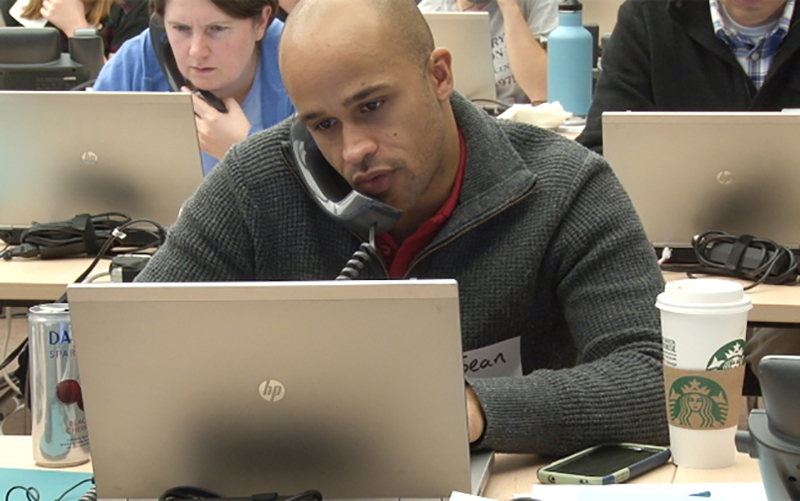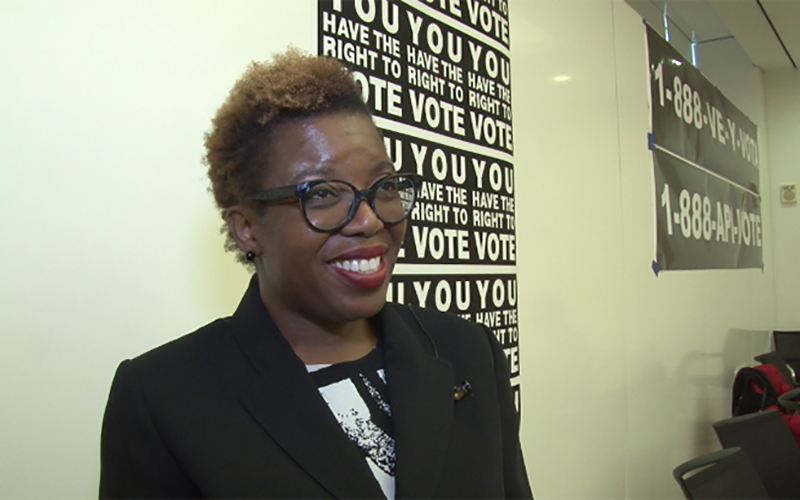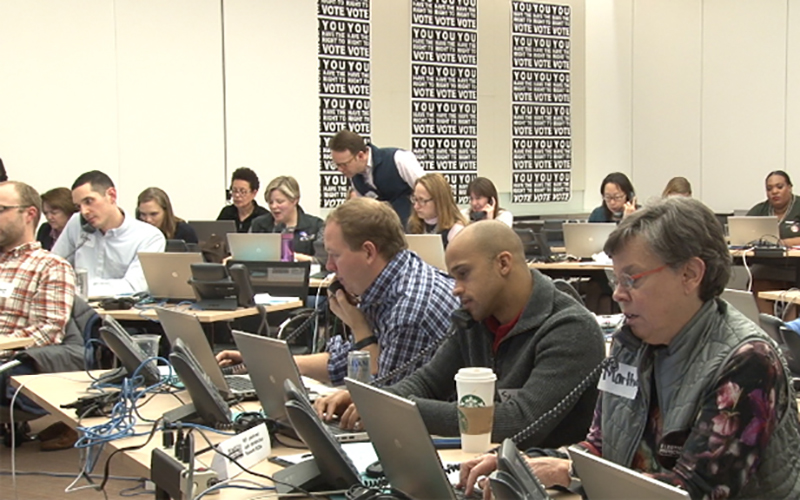- Slug: BC-CNS-Voting Rights,550
- Photos available (thumbnails, captions below)
By AIDA CHAVEZ
Cronkite News
WASHINGTON – Voting rights advocates for months had warned about possible voter intimidation at the polls, but voting watchdogs Tuesday were dealing with more routine problems: Long lines, computer issues and a lack of language assistance at polling locations.
“Long lines continue to be a problem, even after the presidential preference primary with the consolidation of polling places closing,” said Marcia Johnson-Blanco, co-director of the Lawyers’ Committee’s Voting Rights Project, which runs an Election Day hotline for voting problems.
Still, the Lawyers’ Committee for Civil Rights Under Law said that by 9:30 a.m. Eastern time, it had received more than 5,500 calls reporting polling place problems.
Eduardo Sainz, the Arizona Deputy Director of Mi Familia Vota, a get-out-the-vote organization for the Latino community, also said the organization has received calls about long lines at polling places across the state during Election Day.
“We have seen different issues across the county, here in Maricopa, where a lot of the voting machines are down — computers, printers — creating long lines at the polls.” Sainz said.
Another “very concerning” issue the organization noticed early on was the lack of Spanish translators at the polling locations, Sainz said.
“Some of the polling locations with high Latino populations, they don’t have Spanish speaking poll workers where voters might not fully understand everything in English.”
But Laura Maristany with the National Association of Latino Elected and Appointed Officials Educational Fund said long lines at polling locations are “pretty standard in several states” and are not particular to Arizona.
“Some of the questions we’ve gotten and some of the issues we’ve seen today are lack of language assistance in localities that are required under Section 203 of (the Voting Rights Act) to have language assistance,” Maristany said. “We have seen some locations that some folks have called about locations that didn’t open on time. The long lines being reported, I think that’s pretty standard in several states.”
Maristany pointed to one instance of voter intimidation that was reported to her organization: A Latino man who said two men campaigning for Republican presidential nominee Donald Trump came to his house and threatened him with deportation if he did not vote for the business mogul.
“The men told him that they were with the Trump campaign,” Maristany said of the incident, which took place Sunday in Virginia. “They told him that he better vote for Trump or he would get deported and this is a voter, he’s a US citizen.”
The Arizona Democratic Party filed a lawsuit against the Trump campaign last week, alleging that the campaign, the Arizona Republican Party and campaign adviser Roger Stone Jr. were “conspiring to threaten, intimidate, and thereby prevent minority voters in urban neighborhoods from voting in the 2016 election.”
The lawsuit was part of a week of election-related legal challenges in Arizona, including a Supreme Court ruling that allowed a state law barring mass ballot-collection to stand.
Despite the lack of voter intimidation problems in Arizona, Johnson-Blanco said the state’s legal issues could bar voters from hitting the polls in future elections.
“With the ballot harvesting, I think that’s unique to Arizona,” she said. “There has been some confusion there about being able to help voters cast their absentee ballots. So that’s a uniquely Arizona issue that has come up this election.”
– Allie Bice and Jessica Suerth contributed to this article.
^__=
A volunteer fields Election Day calls at the Voting Rights Project run by the Lawyers Committee for Civil Rights Under Law, which tries to address problems at polling places. (Photo by Dillion Eddie/Cronkite News)
Marcia Johnson-Blanco, co-director of the Voting Rights Project, said long lines at polling places continued to be a problem in Arizona, even after delays in the presidential primary made national headlines. (Photo by Dillion Eddie/Cronkite News)
Volunteers at the election hotline had received more than 5,000 calls just hours after polls opened Tuesday, but the problems were more typical Election Day hassles and not voter intimidation as some feared. (Photo by Dillion Eddie/Cronkite News)


